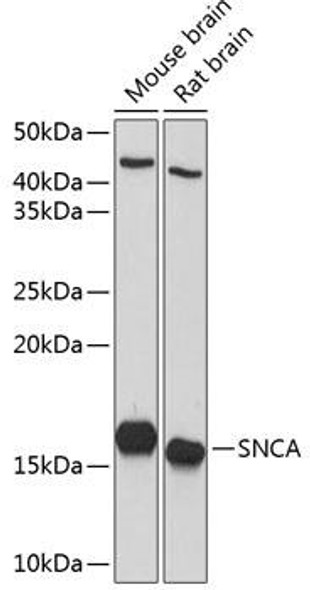SNCA Monoclonal Antibody [P5C2AT] (CPAB0511)
- SKU:
- CPAB0511
- Product Type:
- Antibody
- Antibody Type:
- Monoclonal Antibody
- Reactivity:
- Universal
- Host Species:
- Mouse
- Isotype:
- IgG1
- Clone:
- P5C2AT
- Applications:
- WB
- ELISA
Description
SNCA Monoclonal Antibody [P5C2AT] (CPAB0511)
The SNCA Polyclonal Antibody (CPAB0511) is a valuable tool for researchers studying SNCA, a protein associated with Parkinson's disease and other neurodegenerative disorders. This antibody is raised in rabbits and is highly reactive with human samples, making it ideal for use in Western blot applications to detect and analyze SNCA expression in various cell types.SNCA, also known as alpha-synuclein, is a key player in the pathogenesis of Parkinson's disease, with its abnormal aggregation leading to neuronal dysfunction and cell death.
Research on SNCA has implications not only in Parkinson's disease but also in other neurodegenerative conditions, making it a promising target for therapeutic interventions.By utilizing the SNCA Polyclonal Antibody (CPAB0511), researchers can gain valuable insights into the role of SNCA in neurodegeneration and potentially identify new targets for drug development in the fight against these debilitating diseases. This antibody is a valuable tool for advancing our understanding of SNCA biology and its impact on human health.
| Product Name: | SNCA Antibody |
| Product Sku: | CPAB0511 |
| Size: | 5μg |
| Host Species: | Mouse |
| Immunogen: | Anti-human α-Synuclein mAb is derived from hybridization of mouse SP2/ myeloma cells with spleen cells from BALB/c mice immunized with recombinant human α -Synuclein amino acids 61-95 purified from Ecoli. |
| Clone: | P5C2AT. |
| Reactivity: | Other bodies |
| Applications: | Western Blot, ELISA |
| Purification Method: | α-Synuclein antibody was purified from mouse ascitic fluids by protein-G affinity chromatography. |
| Isotype: | IgG1 |
| Background: | α-Synuclein (amino acids 1-140), an acidic neuronal protein of 140 amino acids, is extremely heat-resistant and is natively unfolded with an extended structure primarily composed of random coils. α-synuclein has been suggested to be implicated in the pathogenesis of Parkinsons disease and related neurodegenerative disorders, and more recently, to be an important regulatory component of vesicular transport in neuronal cells. Moreover, recent studies have shown that α-synuclein has chaperone activity and that this activity is lost upon removing its C-terminal acidic tail (amino acids 96-140). |
| Synonyms: | Alpha-synuclein, Non-A beta component of AD amyloid, Non-A4 component of amyloid precursor, NACP, PD1, PARK1, PARK4, MGC110988, α-Synuclein, SNCA. |
| Storage Buffer: | For periods up to 1 month store at 4°C, for longer periods of time, store at -20°C. Prevent freeze thaw cycles. |





